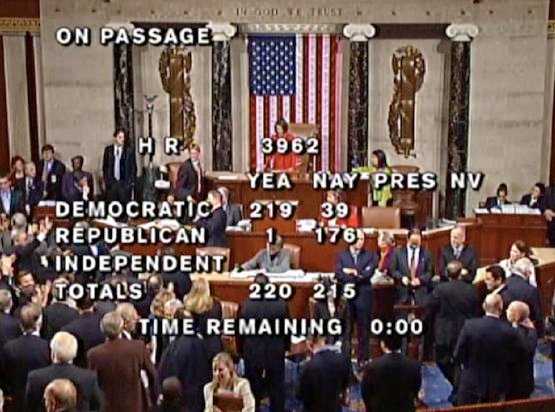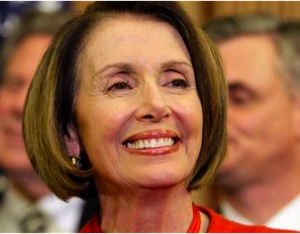
The moment came like a mouse poking its nose into a room. CSPAN’s “Yea” total morphed from 217 to 218, the number required for passage of HR 3962, the “Affordable Health Care for America Act.” I was in the guestroom upstairs, where the heat hadn’t been turned on since we arrived back from Denver. I’d been watching CSPAN all night on my computer, but as the final vote came I wanted to be somehow closer to history, so I punched in CNN to find two third-string talking heads trivializing the moment. I wanted David Gergen to pronounce the historic significance, or even Wolfie. But the moment came, nonetheless. I am 59 years old. I want to remember this.
I have all 1,990 pages as a .pdf document on my Kindle DX. It took approximately 20  seconds to download it. Here’s a vision from 40 years from now, when I plan to still be blogging or whatever the equivalent will be in 2049: My 16-year-old great-granddaughter looks at a photo of a guy thumping on a fat stack of white material, complaining about its length — 1,990 pages! “What’s a page, Great-Grampa?” Well, my child…
seconds to download it. Here’s a vision from 40 years from now, when I plan to still be blogging or whatever the equivalent will be in 2049: My 16-year-old great-granddaughter looks at a photo of a guy thumping on a fat stack of white material, complaining about its length — 1,990 pages! “What’s a page, Great-Grampa?” Well, my child…
I confess that I have not been a big supporter of House Speaker Nancy Pelosi. I don’t want to examine my bias closely, because I suspect it’s an unsavory amalgam of prejudice against California, a certain sound of voice, and of women who are not stylish and uber-confident, like Condi Rice, Hillary Clinton, and, of course, Michelle. But I found it striking how the opponents of health care reform had clearly decided to use demonization of Pelosi as a refrain. “Pelosi’s Bill,” was the sneering handle applied, as if that’s all you needed to know about it in order to run screaming from the hall. The Wonkette satirizes the Pelosi-as-demon meme with an animated graphic showing her teeth turning into fangs under the headline, “House Votes to Kill Your Grandmother & All Christians, 220-215.” So when the self-congratulatory media appearance came, I was surprised to see a woman in a red dress without horns or a pitchfork. What struck me  more was how convincing members of the House leadership sounded in attributing passage of the bill to the efforts of this sometimes-halting San Francisco grandmother of seven. If the Affordable Health Care for America Act becomes law, Pelosi’s foes will have given her a leg up in the history books by trying to use a caricature of her to kill it.
more was how convincing members of the House leadership sounded in attributing passage of the bill to the efforts of this sometimes-halting San Francisco grandmother of seven. If the Affordable Health Care for America Act becomes law, Pelosi’s foes will have given her a leg up in the history books by trying to use a caricature of her to kill it.
I loved the one-minute statements by members of the House, alternating for and against the bill. It was like a Twitter stream in the variety and the relief of knowing that everyone had to observe the same character limit. (Luckily there are no Leaders of the House of Twitter granted immunity from 140 characters the way Pelosi and Minority Leader John Boehner are.) It’s one thing to see Rachel Maddow or Rush bloviate for ratings and huge salaries. It’s quite another to see scores of Americans elected by their neighbors speak from the heart with varying levels of eloquence and effectiveness. Each one is a story of knocking on doors, building organizations, learning the ropes of Congress, sitting through boring hearings on boring topics that matter in people’s lives. That they disagree with each so violently makes me sigh with appreciation at this system of government that has, so far, mainly contained irreconcilable differences of opinion on what course the nation should take. Instead of a gun or explosive device, the sharp sound of a gavel is enough to assure the next speaker his or her chance to be heard.
I am a moderate. Which means I don’t give myself the comfort of believing that everyone opposing this bill is a selfish lunatic. Those who see this turn of the wheel as a dire retreat from individual freedoms speak for me, too, because I also cherish the individual freedoms in this country. My parents’ formative years coincided with World War II, when the continuation of these freedoms was seriously in doubt. Maybe that makes them wiser than I am, better able to see threats disguised as progress. But I have to enter the world of ideas and political engagement where I arrived, coming of age in the 1960s instead of the 1940s. So I embrace the health care reform bill with hope tainted with apprehension about the deficit, and the swelling of the federal bureaucracy. The hope part has to do with my confidence that my country always seems to find its way toward justice and individual opportunity — a combination that continues to beckon would-be immigrants from around the world.
I haven’t mentioned the President. I worked for his election, because I believed he was a moderate, too. More than that, I hoped the “no drama” part of his nickname would enable him to successfully slog toward his objectives, with the discipline and emotional wisdom he displayed during the long campaign. I remember the night before the election, when my wife and I gathered with other volunteers in a small room in Denver to listen to Obama’s pep talk to thousands of campaign workers via a telephone hookup. The polling showed a probable win, but the candidate urged us to ignore it. “Leave it all on the field,” he said from a plane somewhere between final campaign stops. I’m sure he’s saying the same thing now.
